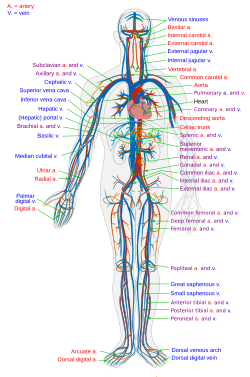The circulatory system
The circulatory system, also called the cardiovascular system or the vascular system, is an organ system that permits blood to circulate and transport nutrients (such as amino acids andelektrobites, oxygen,carbon dioxide,ormones and bloodcells to and from the cells in the body to provide nourishment and help in fighting diseases, stabilize temperature and pH, and maintain The circulatory system, also called the cardiovascular system or the vascular system, is an organ system that permits blood to circulate and transport nutrients (such as amino acids and electrolytes), oxygen, carbon dioxide, hormones, and blood cells to and from the cells in the body to provide nourishment and help in fighting diseases, stabilize temperature and pH, and maintain homeostasis..The circulatory system of the blood is seen as having two components, a systemic circulation and a pulmonary circulation.[4]
While humans, as well as other vertebrates, have a closed cardiovascular system (meaning that the blood never leaves the network of arteries, veins and capillaries), some invertebrate groups have an open cardiovascular system. The lymphatic system, on the other hand, is an open system providing an accessory route for excess interstitial fluid to be returned to the blood.[5] The more primitive, diploblastic 

THANKS FOR WATCHIN

No hay comentarios:
Publicar un comentario